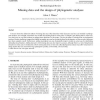Free Online Productivity Tools
i2Speak
i2Symbol
i2OCR
iTex2Img
iWeb2Print
iWeb2Shot
i2Type
iPdf2Split
iPdf2Merge
i2Bopomofo
i2Arabic
i2Style
i2Image
i2PDF
iLatex2Rtf
Sci2ools
JBI
2006
2006
Missing data and the design of phylogenetic analyses
Concerns about the deleterious effects of missing data may often determine which characters and taxa are included in phylogenetic analyses. For example, researchers may exclude taxa lacking data for some genes or exclude a gene lacking data in some taxa. Yet, there may be very little evidence to support these decisions. In this paper, I review the effects of missing data on phylogenetic analyses. Recent simulations suggest that highly incomplete taxa can be accurately placed in phylogenies, as long as many characters have been sampled overall. Furthermore, adding incomplete taxa can dramatically improve results in some cases by subdividing misleading long branches. Adding characters with missing data can also improve accuracy, although there is a risk of long-branch attraction in some cases. Consideration of how missing data does (or does not) affect phylogenetic analyses may allow researchers to design studies that can reconstruct large phylogenies quickly, economically, and accurate...
Related Content
| Added | 13 Dec 2010 |
| Updated | 13 Dec 2010 |
| Type | Journal |
| Year | 2006 |
| Where | JBI |
| Authors | John J. Wiens |
Comments (0)

